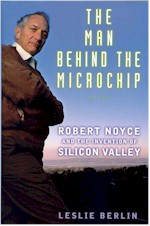 |
|
|
| ||||||
|
|
This page is the original source of this review, though you may also find it on Amazon or other sites. | ||
| Book Reviews Home | Free Audio Books | |
 |
Book Review of: The Man Behind the Microchip
The Man Behind the Microchip:
|
| Review
of
The Man Behind the Microchip, by Leslie Berlin Reviewer: Mark Lamendola, Senior IEEE member, IEEE Region 5 Outstanding Member, and recipient of multiple IEEE awards. This review is a departure from my typical "book report" style, because I have too many things to say about it for that format to work. Isaac Asimov called the invention of integrated circuit (IC) "the most important moment since man emerged as a life form." If you look at how ICs have changed the world, that's a hard viewpoint to argue against. I personally own quite a few ICs and you probably do also. They are everywhere. If you own a cell phone, a computer, or an automobile, you own at least several million transistors. Transistors inside ICs have made possible many things that were not even imagined 100 years ago. Think about all of today's communications, conveniences, explorations, exchanges, transportation, information processing, productivity, and advances in medicine. None of this would exist, if not for Dr. Bob Noyce. It's hard to imagine that the drive, intelligence, and unique personality of one man could have had so much influence on bringing this about. But, it did. The IC changed the macro culture--even our brains are wired differently because of microelectronics (see https://www.mindconnection.com/books/thenewbrain.htm). It also created a micro culture we call Silicon Valley--a major engine for economic and scientific growth. The change brought about by Dr. Noyce was deep and lasting.
This book is the story of that change and of the man behind it. But if Dr. Noyce, who died in 1990, were here today, he would make it clear that every invention depends on the breakthroughs that came before it. So in The Man Behind the Microchip, you read not just about Dr. Noyce, but about the people whom he motivated and inspired. The Man Behind the Microchip offers at least seven things to the reader:
While reviewing this book, I exchanged e-mails with Dick Hodgman (not to be confused with Dick Hodgson, who is in the book). Hodgman is another IEEE Senior member whom I hold in awe. He worked at Intel when Noyce was there, and they spoke many times. Dick helped me get some thoughts together for this review. Form is important, as it dictates readability. Fortunately, this book scored very well on substance and on form. This book actually uses Standard Written English (SWE). This was a refreshing change from the Pidgin English that so many of today's authors slop onto our reading palettes. The care taken in writing this book shows that the author and publisher actually cared about the reader. That's a huge plus. Warren Buffet, who "does not give endorsements," endorsed this book. After reading it, I can see why. If you have any interest in history, human drama, or the genesis of Silicon Valley, this book is a must read. I don't say that just because I'm active in the IEEE and Bob Noyce was "one of our own." I say that because you would not be reading this review--or anything else--online if not for Dr. Noyce. Nor would there be an Amazon.com, cell phones, or any of the thousands of other wonderful things that we take for granted today. Don't you want to know how it all came about? Read this book and find out. | |
> >
About these reviewsYou may be wondering why the reviews here are any different from the hundreds of "reviews" posted online. Notice the quotation marks? I've been reviewing books for sites like Amazon for many years now, and it dismays me that Amazon found it necessary to post a minimum word count for reviews. It further dismays me that it's only 20 words. If that's all you have to say about a book, why bother? And why waste everyone else's time with such drivel? As a reader of such reviews, I feel like I am being told that I do not matter. The flippancy of people who write these terse "reviews" is insulting to the authors also, I would suspect. This sound bite blathering taking the place of any actual communication is increasingly a problem in our mindless, blog-posting Webosphere. Sadly, Google rewards such pointlessness as "content" so we just get more if this inanity. My reviews, contrary to current (non) standards, actually tell you about the book. I always got an "A" on a book review I did as a kid (that's how I remember it anyhow, and it's my story so I'm sticking to it). A book review contains certain elements and has a logical structure. It informs the reader about the book. A book review may also tell the reader whether the reviewer liked it, but revealing a reviewer's personal taste is not necessary for an informative book review. About your reviewer
About reading styleNo, I do not "speed read" through these. That said, I do read at a fast rate. But, in contrast to speed reading, I read everything when I read a book for review. Speed reading is a specialized type of reading that requires skipping text as you go. Using this technique, I've been able to consistently "max out" a speed reading machine at 2080 words per minute with 80% comprehension. This method is great if you are out to show how fast you can read. But I didn't use it in graduate school and I don't use it now. I think it takes the joy out of reading, and that pleasure is a big part of why I read. |
| |||||